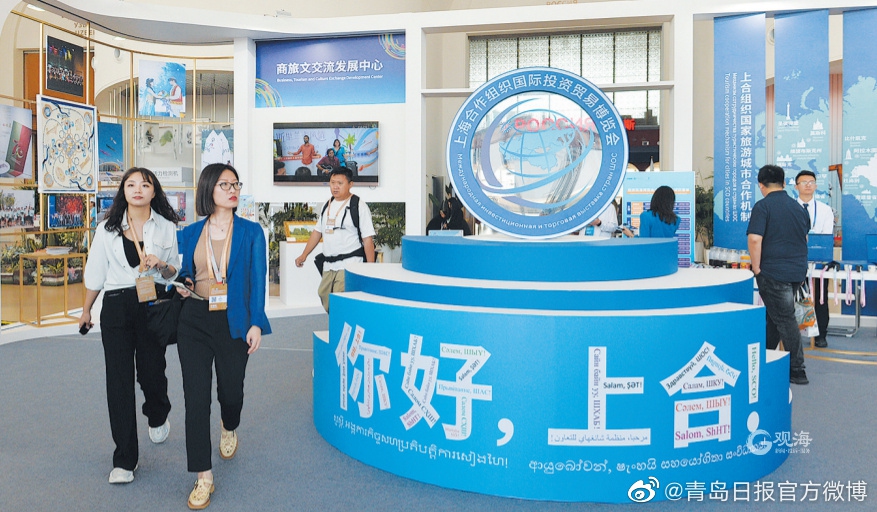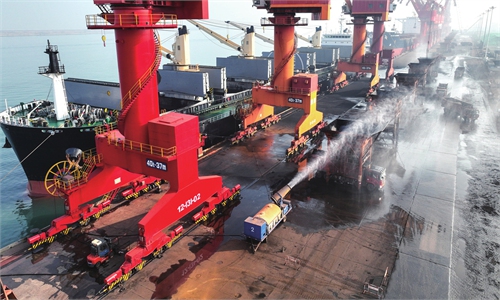
The SCO International Investment and Trade Fair was held in Qingdao, East China's Shandong Province on June 15, 2023. Photo: Courtesy of Qingdao Daily
Promoting sustained improvement in economic performance requires a better utilization of small and medium-sized enterprises (SMEs), which are indispensable for maintaining economic growth, stability in investments, and driving the development of specialized and sophisticated enterprises that produce new and unique products. Ning Jizhe, a member of the 14th Chinese People's Political Consultative Conference (CPPCC) National Committee and deputy director of the Economic Affairs Committee, made these remarks on Sunday during the opening ceremony of an investment and financing fair for SMEs.
Ning said that about 5 percent of the expected economic growth target can be achieved, while greater efforts are required to ensure the economic operation with improved quality, especially giving full play to the important role of enterprises as the main body of market production and operation.
In June, China's official manufacturing purchasing managers' index (PMI) rose to 49 percent, representing a 0.2 percentage point increase compared to May. Breaking it down by industrial scale, the PMI for large-scale and mid-sized enterprises experienced month-on-month growth of 0.3 percentage point and 1.3 percentage points, reaching 50.3 percent and 48.9 percent in June, respectively. Conversely, the PMI for small-sized enterprises declined by 1.5 percentage points, reaching 46.4 percent during the same period.
According to Ning, the data indicated that the country's manufacturing recovery showed a bottoming out trend, while the recovery between large companies and the SMEs remains unbalanced.
590
According to official statistics, over 90 percent of the 50 million enterprises in China are SMEs, and more than 110 million individual business households are also part of small and micro business subjects, forming a significant force in the economic recovery.
"We should consolidate the contact-related consumption and expand the bulk consumption including automobiles and housing, in order to expedite the recovery of the light textile and home appliance industries. Meanwhile, we should maintain the rapid growth of the equipment industry and ensure stable growth in energy supply, in a bid to promote the rebound of the raw material industry and facilitate the rehabilitation of the real estate industry," Ning said.
In order to stabilize investment, the government should create a market-oriented and international business environment, creating strong conditions and an atmosphere for private enterprises and SMEs to expand their investments.
At the same time, private enterprises and SMEs should enhance confidence and invest in innovation for consumption scenes, transform traditional industries, and develop emerging industries. They should actively participate in the country's new infrastructure and traditional infrastructure project investments to stabilize growth and adjust the industrial structure, according to Ning.
Ning added that the government should promote the deep integration of the innovation chain, industrial chain, capital chain, and talent chain of SMEs. Related departments should improve the financial support system to alleviate the financial pressure on SMEs and optimize the mechanisms for talent introduction and cultivation, in order to strengthen the foundation of high-quality enterprise development.
Jin Keyu, a professor from the London School of Economics and Political Science, told the Global Times during the World Economic Forum's 14th Annual Meeting of the New Champions that China's economic recovery cannot rely solely on infrastructure spending. It must come from good macroeconomic policies, greater transparency, and stronger support for SMEs.
"A fiscal stimulus is needed, which could involve increased government spending, as well as reducing the interest rates for SMEs, easing their capital burdens, and providing more financing," Jin noted.

